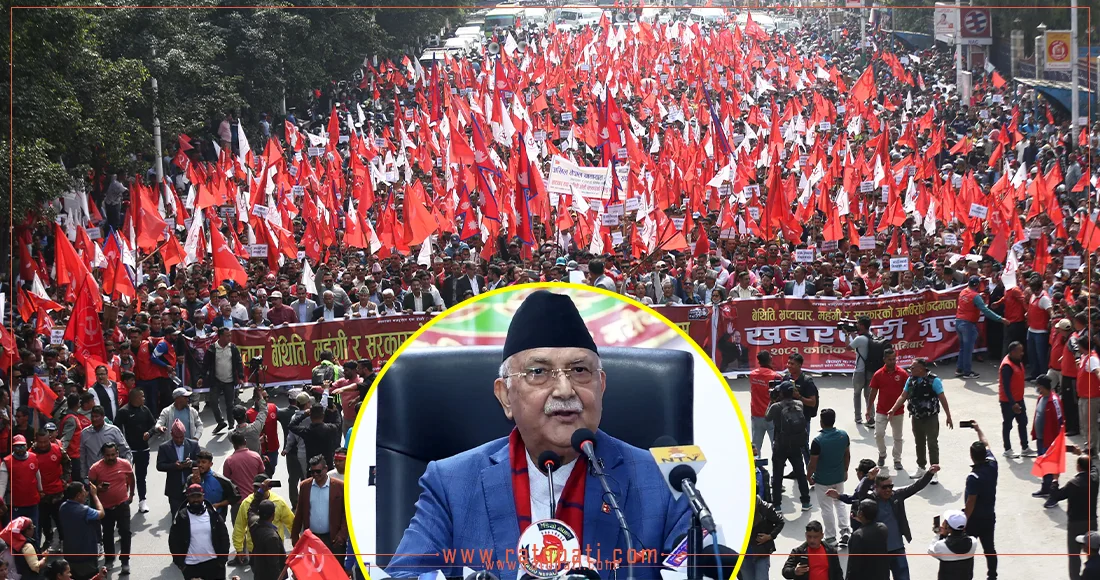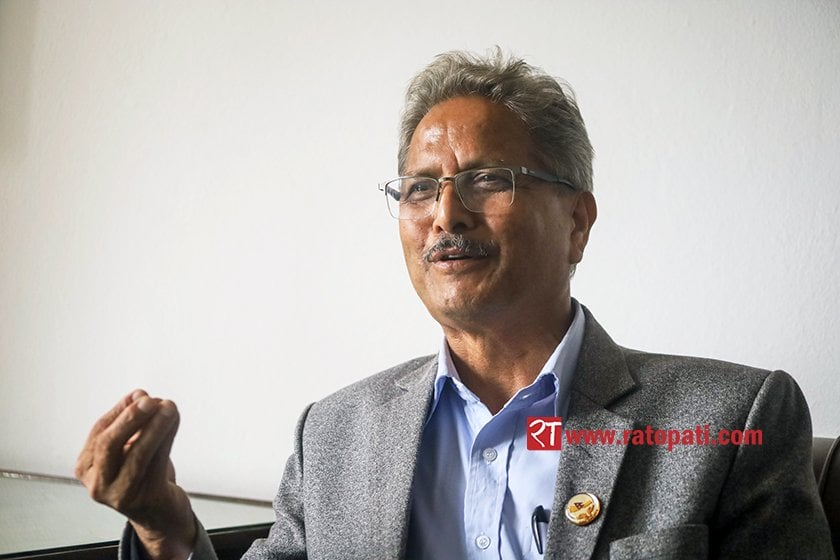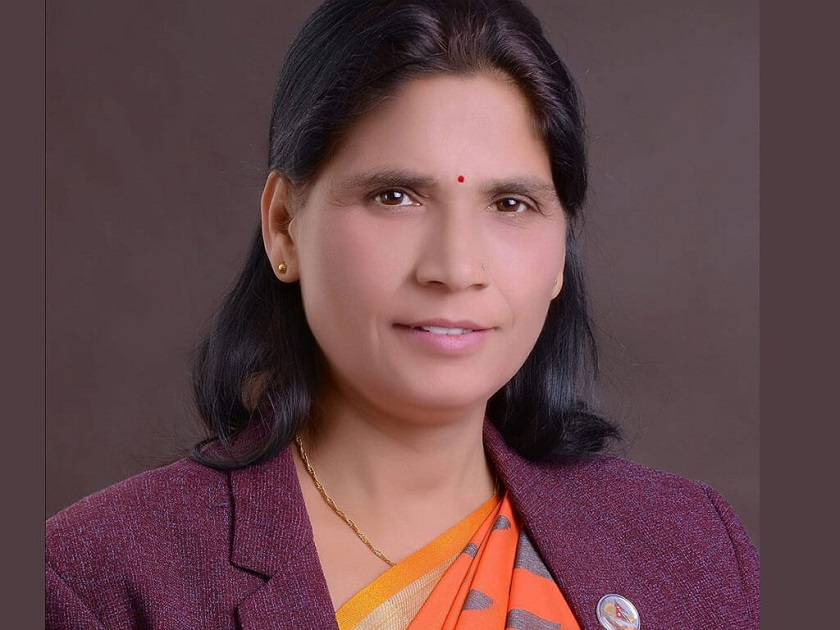Ruling parties prepare for ruthless response as opposition prepares taking to the streets

Kathmandu, October 28 — It seems that both the ruling party and the opposition are strategizing to pressure each other. Following aggressive actions by opposition parties against the government led by KP Sharma Oli, the ruling party has indicated a willingness to be more ruthless.
On October 25, a meeting of seven ruling coalition parties at the Prime Minister's residence in Baluwatar concluded that any undesirable activities that promote chaos or contribute to political instability are unacceptable. The decision made in the meeting was that seeking alternatives to the democratic system and the government through street protests is not permissible.
The ruling coalition stated in a joint release, "The alternative to democracy is a more advanced form of democracy. The path to seeking alternatives to the government is through the parliament and a new mandate. Any attempt to move forward in a manner contrary to this is clearly against the values and principles of democracy. We urge all relevant parties to remain aware and vigilant about this."
On the other hand, opposition parties have concluded that Prime Minister Oli's government has been entirely unsuccessful over its hundred days in power and have already submitted a 13-point memorandum to him. This memorandum was handed over to the Prime Minister following a meeting of five opposition parties, including the Maoist Centre, held on October 23 at the Parliament building in New Baneshwor. The opposition has also drawn attention to the government’s actions in a meeting with President Ram Chandra Paudel.
Accusing the government of undermining good governance and trying to suppress them through regressive conspiracies, the opposition parties are now taking to the streets in their own ways. At an awareness rally organized by the main opposition party, the Maoist Centre, in Kathmandu on Saturday, Chairman Pushpa Kamal Dahal ‘Prachanda’ warned that this country does not belong to the Congress and UML, emphasizing that one cannot think of committing any crime just because they have technical strength in numbers.
"This country is not the property of the Congress or UML. If anyone thinks they can do whatever they want because of their technical strength in numbers, they have forgotten that the people are above all. Do you think you can do anything without accountability? You will have to answer," Prachanda stated, questioning the government. "If you behave rudely, you will be dragged to answer in the streets as well."
Prachanda expressed strong criticism of Prime Minister Oli during the rally. He stated that there is no meaning in being arrogant with a two-thirds majority propped up by the Congress party.
"There is no meaning or justification in being arrogant with a two-thirds majority supported by the Congress when the leader who previously dissolved parliament and regressed when he had a two-thirds majority is now doing the same. If the voice of public resistance is not heard, we have the power to call a special session of parliament," he warned.
Maoist Centre Deputy General Secretary Haribol Gajurel informed that after the upcoming central committee meeting, the Maoists will launch a strong resistance against the Oli government. He mentioned that the current government has only caused despair among the people, prompting the need for awareness rallies in the streets.

"The government is not working for the public and only spreading despair, so resistance is a natural response. After moving towards eliminating the system itself, we have been compelled to take to the streets. We will bring forward nationwide programs, including public demonstrations, after the central committee meeting," Gajurel told Ratopati.
To make the movement more effective, he indicated that there will be unity and cooperation with patriotic, leftist, and Maoist factions. The Maoists are also preparing to activate the Socialist Front against the Oli government. The front includes the Maoist Centre, Unified Socialist Party, the Nepal Communist Party led by Biplav, and the Nepal Samajwadi Party led by Mahindra Raya.
However, leaders from the ruling party have described the opposition's protests as unjustified, warning that if alternatives to the government are sought from the streets, they will respond ruthlessly. Nepali Congress Joint General Secretary Kishor Singh Rathore accused the opposition of threatening street protests out of frustration for not being in power.
"What are the opposition parties currently protesting for? What is their justification? I see only the pain of not being in power in Prachanda's statement. When in power, he was revolutionary, but once out of power, he talks about regression?" he questioned, adding, "Now is not the time for protests. It is the time for the ruling and opposition parties to come together to solve the people's problems and formulate plans to improve the economy. I feel there is no justification for protests. If they start seeking alternatives from the streets, the government will continue its work."
UML Secretary Padma Aryal remarked that the opposition's movement seems to be a tactic to weaken the UML party. She accused Prachanda of previously attempting to weaken UML by aligning with the Congress party while in power and now threatening protests to achieve the same end after losing power.

"This is all a game to weaken UML. Prachanda is envious of UML's progress. When we were in power, there was an attempt to weaken us with the Congress party. Now, being in the opposition, he may want to weaken us again under various pretexts. This is all a frustration from not being in power," Aryal said.
She also accused internal and external forces of supporting the opposition movement. If alternatives are sought from the streets, she warned that the government will respond with awareness and ruthlessness.
After the elections of 2022, Prachanda was Prime Minister for nearly 19 months with the support of the Congress and UML. He stepped down from power after a seven-point agreement was made between the Congress and UML on July 1 to form a rotational government, including constitutional amendments.
Prachanda was removed from office after failing to secure a vote of confidence in parliament on July 12 and has since been vocally critical of Prime Minister Oli.
Not only the Maoists but also the Rastriya Swatantra Party (RSP), Rastriya Prajatantra Party (RPP), and Unified Socialist are preparing to go to the people in their own ways. RSP President Rabi Lamichhane has been detained by police over allegations of misappropriating cooperative funds. RSP leaders and activists have taken to the streets, accusing the government of politically motivated conspiracies against Lamichhane.
Meanwhile, the RPP has been protesting for the restoration of the monarchy and other 40-point demands since last year. Unified Socialist is preparing to announce public mobilization programs after resolving internal disputes.










Leave Comment